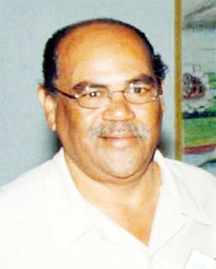High hopes for another year of record production in the country’s gold industry are doing little to conceal the escalating tensions between government and the sector over what the Guyana Gold and Diamond Miners Association (GGDMA) perceives as a battle by gold miners to stave off government’s attempts to tighten its control over the sector.
Former GGDMA Executive Director Edward Shields, who currently serves as a consultant to the mining body, told Stabroek Business in an exclusive and frank interview earlier this week that there were several “pressing issues” on the “agenda” of the local mining community which required definitive pronouncements from government.
According to Shields, simmering tensions between government and the gold mining industry arising out of the former’s assertion that the mining of gold must be informed by stricter environmental considerations, have escalated in the wake of the setting up of the Ministry of Mining and Natural Resources.

Shields said that the manner in which the new ministry functions “could give the impression that its real intention is to assume the authority of the Guyana Geology and Mines Commission (GGMC).
This newspaper has been informed by a source close to the GGMC that a customary weekly meeting of senior GGMC officials is now being chaired by Mining and Natural Resources Minister Robert Persaud, a circumstance that does not sit well with the officials. “Frankly, and as someone close to the sector and the GGMC, I have gotten the impression from interacting with officials that they are frustrated,” Shields told Stabroek Business.
Meanwhile, according to Shields, action is yet to be taken on the undertaking given by the Guyana Police Force to remove illegal shops and landings in interior mining communities.
Shields explained that any action by the police would have to be preceded by moves by the GGMC to identify those shops and landings that were operating illegally. “It is the GGMC that issues the business permits (BPs) to the owners of these operations and it is for them to indicate which are illegal and which are not,” Shields said. The GGDMA consultant told Stabroek Business that it appeared that it had now become a question of “passing the buck” since the view was now being expressed that the Customs and Trade Administration ought to play a role in identifying the illegal shops; the vast majority of which offer alcohol for sale using permits issued by Customs.
Shields said that while some of the shops serve both as outlets for illegal drugs and havens for criminals, they continued to exist because the relevant authorities did not appear to have the will to regularize the situation.
Miners affiliated to the GGDMA met recently a passed a vote of no confidence in Minister Persaud and Shields told Stabroek Business that members of the association were “currently in a mobilizing mode”. Shields said the position of the miners had been informed by what they regard as a posture of non-consultation with the sector by the Natural Resources Ministry. He noted that since authority in the matter of the granting of operating licences for gold mining had passed to the ministry, “it appears that the processing of such licences was being done by the ministry on a case-by-case basis,” though Shields conceded that two days after the resolution of no confidence in the minister had been passed a few hundred applications had been processed.
Meanwhile, according to Shields, government has moved to “cut out” local middle men who were “fronting” the acquisition of work permits for foreigners– predominantly Brazilian–miners. Shields said he understood that several work permits had been issued to the foreign miners and that the local agencies responsible for vetting the work permit applications and issuing the permits – the GGMC and the Ministry of Home Affairs, respectively – were cooperating with a local entity representing the Brazilian miners.
Shields told Stabroek Business that one of the concerns of the miners was that they were keen to ensure that they continue to deal with the GGMC on a routine basis. “We would like to think that the board and the minister are entities that we can resort to in cases where we might wish to appeal decisions made by the GGMC. The problem is that everyone is now beginning to get the impression that the GGMC has been emasculated,” Shields added.




